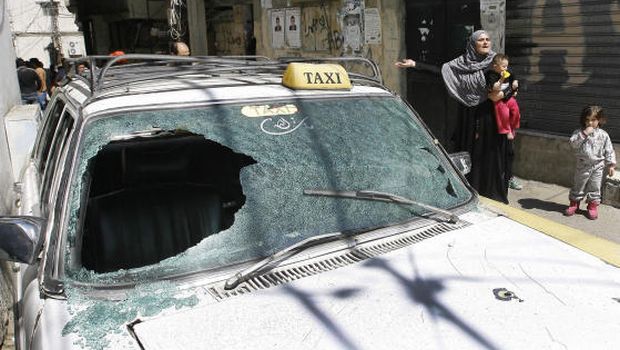
A Palestinian woman and her children stand next to a damaged car after clashes erupted between supporters of a former Fatah commander and members of a rival armed group, Ansar Allah, at the Palestinian refugee camp of Mieh Mieh in the southern Lebanese city of Sidon, on April 7, 2014. (AP Photo/Mohammed Zaatari)
Beirut, Asharq Al-Awsat—At least eight people were killed and 10 injured in clashes between two Palestinian factions at the Mieh Mieh Palestinian refugee camp near the Lebanese city of Sidon on Monday.
The leader of Fatah’s Al-Aqsa Martyrs Brigades in Lebanon, Brig. Gen. Munir Al-Maqdah, said the clashes resulted from “a personal incident which took place 10 days ago, and which all parties tried to contain without success.”
Maqdah said the incident involved the Ansar Allah (Soldiers of God) group led by Jamal Suleiman, and the Shuhadaa Al-Awdah (Martyrs of the Return) group led by Ahmad Rashid, who was killed in the clashes.
A fragile calm prevailed over the camp as the clashes subsided in the afternoon following the intervention of Palestinian officials, and after the Lebanese army imposed a security cordon around the camp.
The Ansar Allah group reportedly took control of the headquarters of Ahmad Rashid’s group following his death after a battle which lasted more than 90 minutes, and in which heavy machine guns and rockets were used.
Another senior Fatah official in South Lebanon, Brig. Gen. Maher Shabaitah, told AFP that tensions between the two sides escalated two weeks ago when “an incident with no political links took place, as a result of a personal disagreement between members of both groups, which escalated into verbal exchanges and physical blows. Fatah intervened to resolve it.”
Among those killed in the clashes were Ahmad Rashid, two of his brothers, and a rescue worker from the Ain Al-Hilweh camp who was trying to evacuate the injured, according to sources from the camp.
The sources added: “Urgent meetings took place in the nearby the Ain Al-Hilweh camp as well as the Mieh Mieh camp, which were attended by all Islamist groups, in order to contain the incident.”
Sources from the camp, speaking on condition of anonymity, told Asharq Al-Awsat that there were conflicting accounts circulating as to what had happened to trigger the violence.
One account said the leader of Shuhadaa Al-Awdah, Ahmad Rashid, was fired at in the street, killing him instantly, leading to the clashes between the two groups.
The second version, given by sources close to the Ansar Allah group, said their leader Jamal Suleiman was the subject of an assassination attempt while leaving the camp to meet two of his supporters who had returned from Saudi Arabia. The sources said a decoy convoy came under attack which resulted in an exchange of gunfire which killed Rashid, before the larger clashes erupted.
The sources added: “Jamal Suleiman is a supporter of Hezbollah since his defection from Fatah in 1989 and is close to the Shi’ite movement. He heads a large armed group in the camp.” The sources added that Suleiman was a leader of a Fatah brigade before he defected.
Rashid also defected from Fatah eight years ago, though “he was popular in the camp because he worked in humanitarian aid and helped find employment for the youth,” according to the same sources.
Palestinian refugee camps in Lebanon are home to armed groups from different backgrounds, as well as many outlaws. Armed clashes often erupt between these groups. Lebanon is home to around 450,000 Palestinian refugees, 200,000 of whom are distributed between 12 camps and residential areas.
